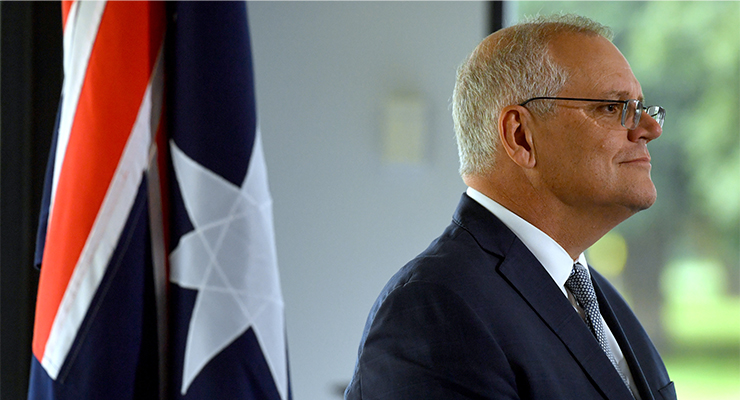
Scott Morrison doesn’t want to be talking about wages. They’ve fallen in real terms while he’s been prime minister, and that fall is accelerating. They’ve been stagnant for the past nine years. And he certainly doesn’t want any suggestion that it is — as Labor says — a deliberate policy by the Coalition.
Morrison’s line on wages is another version of “it’s not my job” — only business can lift wages. There’s no magic pen that Labor can use to increase wages, is a favourite line from the prime minister, one he used again today.
Except Morrison is the head of the biggest employer in the country, the federal government, and for years now he’s suppressed public sector wages — first in the name of fiscal discipline and then, during the pandemic, as a kind of punishment for public servants not losing their jobs as private sector workers were.
The governor of the Reserve Bank, Philip Lowe, has repeatedly lamented the negative role governments have played in poor wages growth — almost as if the head of our central bank thinks there really is a magic pen.
The federal government also controls wages, through its funding and regulation of key sectors like aged care and childcare. The aged care sector — according to literally everyone in that sector, employers and unions alike — the aged care royal commission, and economists have urged a pay rise for aged care workers. Yet Scott Morrison refuses to commit to funding one.
That’s in addition to the submission the government can make to the Fair Work Commission (FWC) as part of its annual wage review across the board.
So there’s no magic pen, but there are several policy levers that will have direct consequences for hundreds of thousands of workers, as well as indirect consequences in terms of driving up wages elsewhere as other sectors compete for workers.
Albanese was asked repeatedly today about wages and whether he could deliver on wages growth, given he has maintained he wants to lift growth, but won’t make any guarantees. He talked up the federal role in submissions to the FWC, his aged care funding commitment and productivity, and emphasised a Hawke-like “full employment summit”. He also made much of a Morrison “gaffe”™ in last night’s yelling competition leaders debate in which the prime minister refused to agree everyone should be paid the minimum wage (Morrison replied: “It depends”).
Facing questions about his own record today, Morrison adopted a decidedly passive role on wages policy. What could he possibly do? It’s not his job, after all.
Businesses can make wages go up. When businesses are doing well and when unemployment is going down, then wages go up. That is how it works. That is exactly what the Reserve Bank governor was saying. When he was noting that wage rises are starting to happen now, we have been waiting for them for some time … Businesses in a weak economy will not be able to afford wage rises. Businesses in a strong economy, that is a whole different story.
So there you have it — for nine years, we’ve had a weak economy, which meant employers couldn’t pay wage rises. Presumably the economy was far stronger under the Rudd and Gillard governments — annual wages growth peaked at 4.3% in 2009 before the global financial crisis hit, then surged back to 3.9% in 2011-12. But under Tony Abbott, Malcolm Turnbull and Scott Morrison, wages growth has never got above 2.7% and spent all of 2017 below 2%.
If that’s at odds with the economic narrative from Morrison and Treasurer Josh Frydenberg that the economy is going great guns, well, take it up with them.
Truth is, our low wages growth is because of a broken industrial relations system in which the rules are stacked against workers and enterprise agreements stifle wages growth and the capacity of workers to exploit tighter labour market conditions. But neither side is willing to talk about returning Australia to an industrial relations environment where workers can properly exploit market conditions to drive up their asking price.
If the press packs pursuing both leaders weren’t so obsessed with gotcha questions, maybe we could get some answers on that.








Crikey is committed to hosting lively discussions. Help us keep the conversation useful, interesting and welcoming. We aim to publish comments quickly in the interest of promoting robust conversation, but we’re a small team and we deploy filters to protect against legal risk. Occasionally your comment may be held up while we review, but we’re working as fast as we can to keep the conversation rolling.
The Crikey comment section is members-only content. Please subscribe to leave a comment.
The Crikey comment section is members-only content. Please login to leave a comment.